Tags
Angélique, Cocuage, Cuckoldry, George Dandin, Gorgibus, jealousy, La Jalousie du Barbouillé, Micheline Bourbeau-Walker
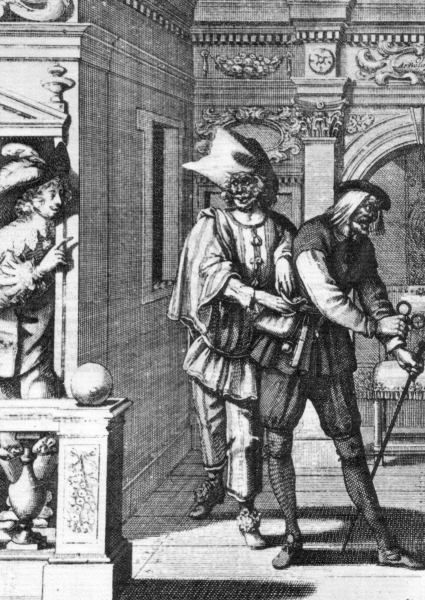
La Jalousie du Barbouillé (documentation.théâtre.com)
I have not found illustrations for La Jalousie du Barbouillé. The image above is a detail from an illustration by Abraham Bosse, showing Turlupin and Gaultier-Garguille, French farceurs at the Hôtel de Bourgogne. The Hôtel de Bourgogne, was the foremost venue for Paris actors and farceurs. Another venue was Le Théâtre du Marais, a jeu de paume, an interior tennis court.
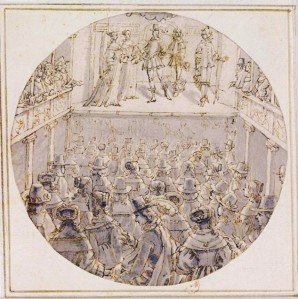
Un Jeu de Paume by Abraham Bosse (Bibliothèque nationale de France)
La Jalousie du Barbouillé is a one-act farce, first performed in 1660. It is often associated with Le Médecin volant. Both are early plays. However, Le Barbouillé seems the blueprint for George Dandin, first performed in 1668. George Dandin is a rich peasant who foolishly marries into an impoverished aristocracy. La Jalousie du Barbouillé was staged a few times after it premièred, but the farce was unexpectedly removed from Molière’s répertoire and the text itself vanished. It was found by Jean-Baptiste Rousseau in the eighteenth century, but was not included in the complete works of Molière until the 1819 edition.
Sources
The Molière21 research group warn that ancestors to Molière’s plays are probably too numerous to list. Cuckoldry and jealousy have long been the subject of farces and fabliaux. Cuckoldry also provided canevas, plots, to the commedia dell’arte. However, Wikipedia’s entry on La Jalousie du Barbouillé mentions sources. One is the commedia dell’arte‘s Villano gelosi, another is a tale from Boccacio’s Decameron, Le Jaloux corrigé. Moreover, the angry or disconsolate Barbouillé and Dandin are incarnations of Pedrolino (Pierrot), the rejected and sad clown.
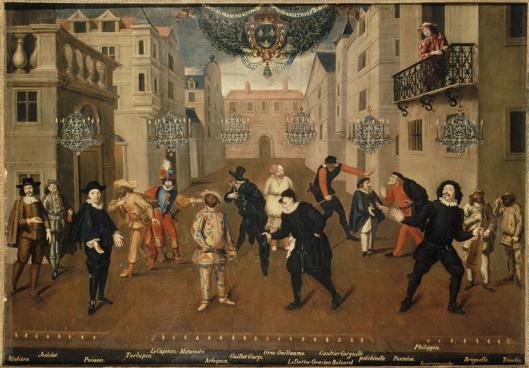
Farceurs français et italiens, 1670 (anonymous)
Our dramatis personæ are:
Le Barbouillé, husband to Angélique.
The Doctor.
Angélique.
Valère, lover to Angélique.
Cathau, maid to Angélique.
Gorgibus, father to Angélique.
Villebrequin (accompanies Gorgibus).
La Vallée.
Le Jaloux
La Jalousie du Barbouillé features one of Molière’s main figures: the jaloux. Le jaloux combines two comedic functions. On the one hand, he is “in love,” but on the other hand, he is the blocking character of comedy, the alazṓn of Greek Old Comedy. If he has yet to marry, he resembles Arnolphe. Reprimands and imprecations are his native and only tongue. We have just read Le Sicilien ou l’Amour peintre. Had Dom Pèdre known the laws of gallantry, Isidore may not have fled with Adraste.
After le Jaloux marries, he remains a jaloux because he fears cuckoldry, which is his fate. The cocu is the laughing-stock of the society of the play. In La Jalousie du Barbouillé, his name suggests that his face is smeared: barbouillé.
Angélique
Yes, Angélique has met Valère and, serving the couple, is Cathau, Angélique’s maid. She is on the lookout. If she sees Gorgibus, Angélique’s father, she warns Valère and Angélique, who stop speaking as lovers do. Valère knows how to change topics:
Mademoiselle, je suis au désespoir de vous apporter de si méchantes nouvelles ; mais aussi bien les auriez-vous apprises de quelque autre ; et, puisque votre frère est fort malade…
Valère à Angélique (Sc. iv, p. 5)
[Mademoiselle, I am very sorry to bring you such bad news, but, you would have heard it from some one else, and since your brother is ill…]
Valère to Angélique (Sc. 4)
The Barbouillé’s Soliloquy
As the curtain lifts, the Barbouillé engages in a soliloquy, as will George Dandin. His soliloquy, or tirade, is a litany of the wrongs he endures, saddled as he is, with a flirtatious wife. He wishes her dead, but would be hanged if he had no proof of adultery:
Il faut avouer que je suis le plus malheureux de tous les hommes ! J’ai une femme qui me fait enrager : au lieu de me donner du soulagement et de faire les choses à mon souhait, elle me fait donner au diable vingt fois le jour ; au lieu de se tenir à la maison, elle aime la promenade, la bonne chère, et fréquente je ne sais quelle sorte de gens. Ah ! pauvre Barbouillé, que tu es misérable ! Il faut pourtant la punir. Si tu la tuais… L’intention ne vaut rien, car tu serais pendu. Si tu la faisais mettre en prison… La carogne en sortirait avec son passe-partout. Que diable faire donc ? Mais voilà monsieur le docteur qui passe par ici, il faut que je lui demande un bon conseil sur ce que je dois faire.
Barbouillé (Sc. I, p. 1)
[Everybody must acknowledge that I am the most unfortunate of men! I have a wife who plagues me to death; and who, instead of bringing me comfort and doing things as I like them to be done, makes me swear at her twenty times a day. Instead of keeping at home, she likes gadding about, eating good dinners, and passing her time with people of I don’t know what description. Ah! poor Barbouillé, how much you are to be pitied! But she must be punished. Suppose you killed her…? It would do no good, for you would be hung afterwards. If you were to have her sent to prison…? The minx would find means of coming out. –What the deuce are you to do?
But here is the doctor coming out this way; suppose I ask his advice on my difficulties.]
Barbouillé (Sc. 1)
The Barbouillé seeks the help of a doctor, a pedant, who is passing by. This doctor cannot give advice. The Barbouillé says a few words, which is all our pedant requires to display his knowledge. Doctors have the reputation of presenting bills. At the end of Scene two, the Doctor therefore indulges in a long tirade aimed at showing that expense is no object. He does’nt take money. The tirade being too long, I will indicate that it is at the very end of Scene ii, p. 4, FR Scene 2, EN.
Gorgibus
In the meantime, Monsieur Gorgibus, Angélique’s father, walks on stage, accompanied by Villebrequin, his entourage. Gorgibus fears cuckoldry as much as the Barbouillé, if not more. Should his daughter commit adultery, which is almost unavoidable, Gorgibus’ reputation would suffer. He is forever visiting his daughter and her husband, begging them to stop quarrelling. They quarrel. (Sc. v, p. 5):
Hé quoi? toujours se quereller! vous n’aurez point la paix dans votre ménage?
Gorgibus au Barbouillé (Sc. v)
[What! will you always be quarrelling! Will you never have peace at home?]
Gorgibus to Barbouillé (Sc. 5)
An incoherent doctor butts in. For instance, he asks the Barbouillé not to use the word enrager: j’enrage [I am bursting with rage.], which is not the correct verb.[1] Whether the Barbouillé uses enrager or an another word is irrelevant. He is a nuisance. As the scene ends, the doctor is dragged away, a cord attached to his foot.
Au milieu de tout ce bruit, le Barbouillé attache le Docteur par le pied, et le fait tomber ; le Docteur se doit laisser sur le dos ; le barbouillé l’entraîne par la corde qu’il lui a attachée au pied, et, pendant qu’il l’entraîne, le Docteur doit toujours parler, et compter par ses doigts toutes ses raisons, comme s’il n’était point à terre.
(Sc. vi, pp. 8-9)
[In the midst of all this, Le Barbouillé ties the Doctor by the legs with a rope, throws him down on his back, and drags him away; the Doctor goes on talking all the time, and counts all his arguments on his fingers, as if he were not on the ground.]
(Sc. 6)
Cuckoldry
In La Jalousie du Barbouillé, Molière rehearses George Dandin ou le Mari confondu, performed in 1668. The two comedies share an episode. The Barbouillé’s Angélique is late returning home and finds herself locked out of the Barbouillé’s house. The Barbouillé will not open the door to let his wife enter.
Oui? Ah! ma foi, tu peux aller coucher d’où tu viens, ou, si tu l’aimes mieux, dans la rue, dans la rue : je n’ouvre point à une coureuse comme toi. Comment, diable! être toute seule à l’heure qu’il est! Je ne sais si c’est imagination, mais mon front m’en paraît plus rude de moitié.
Barbouillé à Angélique (Sc. xi, p. 10)
[Yes, you catch me! You may go and sleep where you come from; I shall not open to a gad-about like you. What! alone at this time of night! I don’t know if it is fancy, but my forehead seems to me already rougher by half.]
Barbouillé to Angélique (Sc. 11)
The Barbouillé so insists on keeping the door closed that Angélique says she will do something he will regret.
Sais-tu bien que si tu me pousses à bout, et que tu me mettes en colère, je ferai quelque chose dont tu te repentiras?
Angélique au Barbouillé (Sc. xi, p. 11)
[Do you know that if you push me too far, and put me in a passion, I may do something which will make you repent your unkindness.]
Angélique to Barbouillé (Sc. 11)
Tiens, si tu ne m’ouvres, je m’en vais me tuer devant la porte ; mes parents, qui sans doute viendront ici auparavant de se coucher, pour savoir si nous sommes bien ensemble, me trouveront morte, et tu seras pendu.
Angélique au Barbouillé (Sc. xi, p. 11)
[I declare that if you do not open to me, I will kill myself before the door; my parents will no doubt come here before going to bed, to see if we are all right together, and they will find me dead, and you will be hanged.]
Angélique to Barbouillé (Sc. 11)
She then makes believe she’s killed herself. Frightened, he goes out of the house, allowing her to enter. It was a trick which George Dandin will play on his wife, in the hope he will be vindicated. He would have the upper hand from the point of you of the law. (Act III. final scenes)
Comments
Le jaloux is doomed, whether or not he is in the right. Courting, le Jaloux cannot make himself loved. He cannot be loved. Once he marries, Molière’s jaloux is cuckolded, un cocu and barbouillé, smeared. He is the laughing-stock of the play’s society and he shames his in-laws, however vigilant a Gorgibus or a Barbouillé. Gorgibus asks his daughter to kiss her “husband:”
Allons, ma fille, embrassez votre mari, et soyez bons amis.
Gorgibus à Angélique (Sc. xii, p. 12)
[Come, daughter, kiss your husband, and be friends.]
Gorgibus to Angélique (Sc. 13)
One does not ask a woman to kiss her husband, nor does one ask a husband to apologize to his wife (George Dandin, p. 291). Angélique and Valère will become lovers. The Sotenville (George Dandin) are prosperous again, but they have sold a daughter and Dandin regrets marrying into the aristocracy. He blames himself.
As the curtain falls, Villebrequin, who has refused the hear sixty to eighty pages of instruction from a reappearing doctor, suggests all go to supper.
Allons-nous-en souper ensemble, nous autres.
Villebrequin à tous (Sc. xiii, p. 13)
Let us all go and have some supper together.
Villebrequin to all (Sc. 13)
This invitation is formulaic and The Jealousy of the Barbouillé, an enigmatic comedy. “Nous autres” go to supper, but George Dandin, a second Barbouillé, feels he may as well drown (George Dandin, p. 291).
RELATED ARTICLES
- Kasyan Yaroslavovitch Golejzovsky’s Harlequin (11 November 2017)
- Molière’s George Dandin (24 June 2016)
- Molière’s « Sicilien » or “Love Makes the Painter” (14 May 2016)
- Molière page
Sources and Resources
- Wikipedia
- Britannica
- The Jealousy of the Barbouillé is Gutenberg’s [eBook #27074] (transl. Charles Heron Wall)
- La Jalousie du Barbouillé is a Wikisource publication (Édition Louandre, 1910)
- La Jalousie du Barbouillé is a toutmoliere.net publication
- George Dandin is an Internet Archive publication (transl. Henri van Laun)
- The first image belongs to (documentation.théâtre.com)
____________________
[1] It is the correct verb.
With kind regards to everyone. 💕
(Apologies for a belated post.)
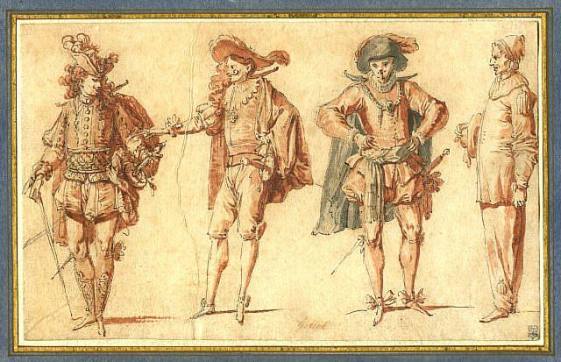
Claude Gillot (1673–1722), Four Commedia dell’arte Figures: Three Gentlemen and Pierrot, c. 1715 (Wiki2.org)
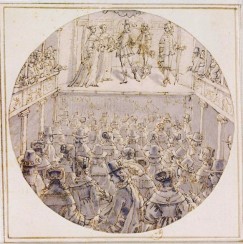
© Micheline Walker
20 May 2019
WordPress


Thorough as ever
LikeLiked by 1 person
I thank you Derrick. I’m glad I chose Molière as my topic. We are reading all the plays. The magic of the internet. Everything is online in both French and English. However, it must be a little difficult for my readers to read all of Molière: every play.
I’m now dreaming of living in a thatched cottage in Britain or France, tending to a garden. Your posts are a constant invitation. 🙂
LikeLiked by 1 person
🙂
LikeLike
Love 💕
LikeLiked by 1 person